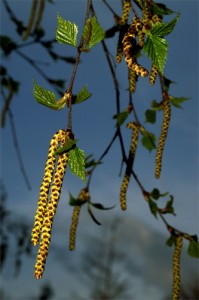Birch
Botanical Name: Betula Pendula
The silver birch was regarded as a symbol of spring – a tree of life and fertility. Folklore has honored it as a protector against demons, and the trees leaves, bark and sap have long been used to fight illness such as bladder infections, kidney stones, eczema and rheumatism.
Plant Facts: A member of the Betulaceae, or birch, family. It grows to a height of 100 feet and is recognized by its grayish-white, peeling bark and dark cracks at the base. The bark and leaves have an organic, bitter taste and act as an astringent.
Origin: Birch is usually found in the thickets and in dry deciduous and evergreen forests of North America, Europe and the temperate zones of northern Asia.
Plant parts: In the United States, branches and bark of the birch tree are used medicinally to make teas through dry distillation.
Components: The leaves contain diuretic flavonoids, anti-inflammatory tannins and saponins, as well as a great deal of vitamin C. The plant juice contains sugar, phytohormones and protein; the bark contains resins and the camphor like compound betulin.
Indications: Birch leaves have diuretic properties because of the flavonoids they contain; they increase urinary excretion without irritating the kidneys. A tea made from the leaves can be used as a flushing agent for urinary tract infections and to help prevent kidney stones. Traditional medicine uses preparations of birch teas for treating gout, abscesses and rheumatism. Hair rinses with birch as an added ingredient are thought to promote growth.
Methods of Administration
Tea infusion: Pour 1 cup of boiling water over 1-2 tsp. of dried birch leaves. Steep for 10-15 min; then strain. Drink 1 cup up to 3 times daily.
Tea decoction: Heat 1 cup of water to boiling; reduce it to a gentle simmer and then add 1 tbsp. of birch bark. Simmer for 15-20 min. and strain. Drink 1-2 cups of the tea daily. The decoction can also serve as the basis for a skin lotion that can be applied to warts or areas with psoriasis or eczema.
Tincture: Pour 1 cup of vodka over 2 tsp. of birch bark in a clean glass jar. Cover; shake. Steep for 3-4 days. Take 1 tsp. of the tincture 2-3 times a day.
Extract: Many teas for the bladder and kidney contain a powder of birch tea or dried extracts of birch bark or leaves. These are sometimes blended with other medicinal plants that have similar diuretic and disinfectant effects.
Lore: Native Americans made a tea with silver birch bark that was used for treating lower back pain. The bark contains mthyl salicylate, a substance that may have effects similar to aspirin.
References:
- The Complete Guide To Natural Healing
Note: Consult with a Physician if you are seeking medical remedies. The information is not intended as medical advice. PagansWorld.org is not liable for the misuse of the information listed above.
Thanks for stopping by! Well wishes to you all and have a great day!
Lisa





